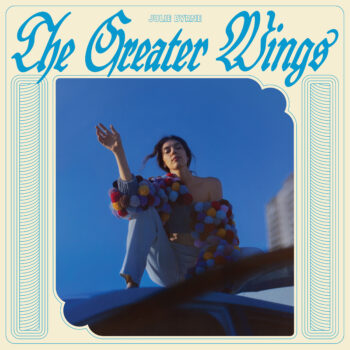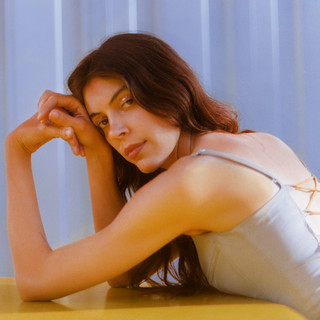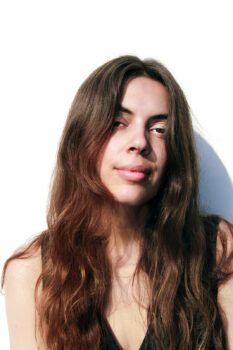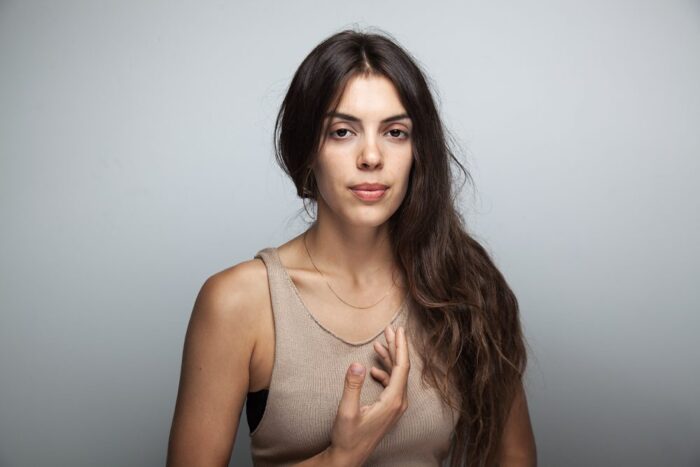Julie Byrne Remains On The Edge Of Mystery: Interview
Julie Byrne releases her long-awaited third album, The Greater Wings, tomorrow. Its been six long years in the making, with tragedy striking along the way.
 The 13th Floor’s Marty Duda spoke to the Buffalo, NY native who now makes her home in Brooklyn. Julie began recording the album in Chicago in early 2020, but the sudden death of her musical collaborator and producer Eric Littmann put things on hold until January 2022. Now, finally The Greater Wings is ready for release and Julie Byrne is ready to talk about it.
The 13th Floor’s Marty Duda spoke to the Buffalo, NY native who now makes her home in Brooklyn. Julie began recording the album in Chicago in early 2020, but the sudden death of her musical collaborator and producer Eric Littmann put things on hold until January 2022. Now, finally The Greater Wings is ready for release and Julie Byrne is ready to talk about it.
Click here to listen to the interview with Julie Byrne:
Or, read a transcription of the interview here:
Marty: It’s been a while since you’ve done this, so how are you feeling about it all?
Julie: I’m just taking it day by day and trying to stay in the moment. I mean, right now I’m really focused on rehearsals and the live performance. So that’s where my attention is at the moment.
Marty: Okay, so let’s talk about that. How are the live performances going to manifest themselves? Do you have a band, what’s happening?
Julie: Yeah, we’re remaining a trio, which is how we travelled for much of Not Even Happiness. And we’ll have synth and violin. And at times we’ll have our friend, Marilou Donovan playing harp.
Marty: Oh cool.
 Julie: And we, yeah, my collaborators, Jake Falby and Katie von Schleicher, they’re… They’re both going to be quite versatile in these live sets. And thankfully, everyone is a multi-instrumentalist, and we’re going to be making good use of that knowledge. Yeah.
Julie: And we, yeah, my collaborators, Jake Falby and Katie von Schleicher, they’re… They’re both going to be quite versatile in these live sets. And thankfully, everyone is a multi-instrumentalist, and we’re going to be making good use of that knowledge. Yeah.
Marty: Do the songs take any…do you have to think about them in a different way when you’re performing live as opposed to when you’re doing the recordings?
Julie: Oh, of course, it’s… In some ways it’s radically different and in others I’m sort of conjuring, you know, the atmosphere that the songs came from. But playing live is a completely different experience because it’s one that is collective and shared and something that I’ve missed very much.
Marty: So why has it taken you so long to come up with this new record and it’s been a while since you’ve toured. I know there are a few reasons. What ones do you want to talk about?
Julie: Well, I guess in my mind it doesn’t, like I… Well… I mean, there are many reasons. One being that the songs… in and of themselves are stories that needed to be lived out and that took time. And I would say, in that way, patience and honest effort are important aspects of my practice. But I think only, I think… you know, the industry standards are different than my own, you know, my own relationship with time as it pertains to my work. And it takes the time that it takes. And yeah, I mean, obviously another reason is that I, you know, I… suffered, we all suffered the loss of one of our closest friends and my main collaborator who produced Not Even Happiness and much of The Greater Wings and you know anyone who’s lived through loss understands what an ongoing process that is.
Marty: Right, right, right. So yeah, I know that the recording session started in Chicago in 2020 and then you had to resume them in 2022 with Alex Somers. So when you got back together with Alex, well, first of all, tell me a little bit of how you and Alex worked together and what that was like up in the Catskills there finishing the record off.
 Julie: Mm-hmm. Well, yes, the recording began with Eric Littmanm of Phantom Posse and Phantom Power in Chicago in early 2021. And the earliest tracking was done in the living room of Eric’s apartment. And he lived on the eighth floor of what was an old hotel that had been originally built for the World’s Fair and then was converted into apartment building, apartments many years later. And yeah, and so we would work at night and on the weekends because he had a job as a lab manager at University of Chicago. And so we would work by night, and we started there. And then we took the recordings out to New York to record with Marilu Donovan on harp, and then to Los Angeles to work with our longtime friend Jake Falby, who did all of the string arrangements. And then it was only a month after that Eric died and the project was put on hold for half a year and then we resumed in the Catskills in early 2022 with Alex and many of our friends from New York were coming through the recording sessions too, to either just offer moral support or, you know, contribute musically. But Alex, I mean, being a producer is such an art, it’s so much more than, you know, technical skill and vision. It’s also a grace in relationship. like a grace of relationship. And I think that he was just such a warm and supportive kind of grounded presence in what was obviously a very difficult experience. And yeah, I have nothing but gratitude for who Alex is. So I feel really blessed to… to finish this out with him.
Julie: Mm-hmm. Well, yes, the recording began with Eric Littmanm of Phantom Posse and Phantom Power in Chicago in early 2021. And the earliest tracking was done in the living room of Eric’s apartment. And he lived on the eighth floor of what was an old hotel that had been originally built for the World’s Fair and then was converted into apartment building, apartments many years later. And yeah, and so we would work at night and on the weekends because he had a job as a lab manager at University of Chicago. And so we would work by night, and we started there. And then we took the recordings out to New York to record with Marilu Donovan on harp, and then to Los Angeles to work with our longtime friend Jake Falby, who did all of the string arrangements. And then it was only a month after that Eric died and the project was put on hold for half a year and then we resumed in the Catskills in early 2022 with Alex and many of our friends from New York were coming through the recording sessions too, to either just offer moral support or, you know, contribute musically. But Alex, I mean, being a producer is such an art, it’s so much more than, you know, technical skill and vision. It’s also a grace in relationship. like a grace of relationship. And I think that he was just such a warm and supportive kind of grounded presence in what was obviously a very difficult experience. And yeah, I have nothing but gratitude for who Alex is. So I feel really blessed to… to finish this out with him.
Marty: So how did you come across him, Alex?
Julie: Um, I met him at a festival in the high desert outside of Phoenix, Arizona, many years ago. And I mean, I was also a Sigur Ros fan as a teenager.
Marty: Uh-huh.
Julie: And so I was, so I guess, you know, in a sense, I’d been kind of, you know, following him, Alex, for a long time. But then… And, but I mean, it was, we would see each other here and there and had something of a friendship, but it wasn’t until we were connected through Ghostly, who, you know, the label that’s putting out this record that we started, yeah, that we really kind of started getting to know each other and working together.
Marty: Okay. Now one of the things I think you got up to in between the releases of your last record in this one was you were doing some work in Portugal. Is that right?
Julie: Mm-hmm. Yes.
Marty: And I think Moonless was written in Portugal. So maybe you can tell me a little bit about how that came about.
Julie: Um, I have toured in Portugal before and, um, it was through, uh, a cultural center in, in Faro that was in collaboration with, um, the community center in Culatra, which was the name of the island, um, that we did this residency on. They organized lodging for two weeks and I lived out there in a very small house by the sea. I mean it’s a small, Culatra is a small barrier island, part of a chain of islands in southern Portugal and it is mostly a fishing economy and there it’s only accessible by boat or ferry and there are no cars on the island and…Yeah, it was from that time. I would take long walks at night and I was there on the night of the new moon and I had never seen a darkness like that looking out onto the ocean and being so far from the city. So Moonless, The title for Moonless and some of the imagery came from Culatra.
Marty: And my understanding is that was the first song you’d written on piano, is that correct?
Julie: Yes, it is.
Marty: So what kind of motivated you to do that?
Julie: Just a hunger to explore and stay curious. I, you know, as a musician, I wanna be a lifelong learner. And I had been wanting to, I had been hoping to pick up piano for a while. And I actually did take a group piano class in a community college that I’d attended in Chicago, which is where the piano music from on my first record came from called Piano Music for Lucy. But in terms of the first like deliberate compositions that I wrote, yeah. I started taking lessons as a 28 year old on the piano. And those were the first music lessons of my life. And yeah, it just really opened me up so much. And such a different way of working than how I work on the guitar and just kind of, yeah, just expanded my practice.
Marty: So have you since written more songs on the piano?
Julie: I have, yes, I have, one that will be heard on this record and a few that will be on the next one.
Marty: I’m guessing Death is the Diamond might be one of those, is that true?
Julie: Yes.
Marty: Now you mentioned Marilu Donovan, and I can hear her vividly on Summer Glass, which I think I’ve also read as kind of, you consider kind of the heart of the record. So is that true? And maybe you can tell me a little bit about how it came together and what Marilu contributed to the tune.
Julie: Yeah, it’s so funny, Marilu is actually my neighbour, we live in the same building. So I’m on the…
Marty: How convenient!
Julie: It is very convenient. I’ll walk down and pass through the foyer and hear the beautiful sounds of her playing. I do feel that Summer Glass is kind of a core statement of the record. And I would say Eric’s synth work is the heartbeat of that song. And I would also say that the kind of apex of our collaboration, I think it’s one of the best things that we’ve ever done together. And it’s something I’m really proud of. Yeah, that arpeggiated synth part just kind of drew me deeper and deeper into its universe. And it really evoked so much lyrically. I was also looking, I felt like very influenced by the work of, by the visual work of Nan Golden at the time. that kind of has an imprint on Summer Glass. But in terms of Mary Lou’s playing on that song, that’s when Eric and I drove to New York from Chicago, and he brought a portable recording setup in his suitcase. And we, yeah, we were staying in the East Village and we took the train out to her place in Queens and she recorded her part in her living room. We just set up shop there and yeah, she laid down, she laid down her part.
Marty: And it kind of segues into Summer’s End. Do you look at those two tracks as kind of one solid piece of work?
Julie: Mm. I don’t see them as one piece of work. Summer’s End is meant to sonically cleanse the palette and offer space to. I guess let the A side of the record metabolize. And Summer’s End is a romantic title. It’s personal to me. It’s referencing a song that Eric wrote for me when we first met. And it was a beautiful song on the nylon string guitar. And it’s called Summer’s End.
Marty: So when people listen to these songs, is it important for you to for them to listen to them in the running order that you’ve kind of created for them, starting with The Greater Wings and finishing with Death is a Diamond?

Julie: Well, I mean I- That’s the… That’s the truest presentation of the record. We actually spent an inordinate amount of time on the sequencing. The sequencing of the record actually became its own art. I was, it took a month, it took a month of just sheer deliberation and like listening to the songs in so many different orders. And it was really through a lot of time and trial and error and conversation and, you know, that it finally became right. But of course, I leave it up to, you know, the songs take on their own life once they’re released. So I just, I leave it to the listener always, you know, no rules, but.
Marty: Kind of off you go into the world…
Julie: Yes. Yeah. Exactly.
Marty: So I’m assuming that these songs were written a while ago and you’ve probably been writing since then. Is that the case? Do you have a backlog of things that you’re kind of looking forward to releasing ultimately?
Julie: I do, yeah. I have an EP coming out on Rough Trade as kind of an addendum to this album, but they’re all new songs and they’re…it’s part of a project that I’m working on here in New York with my friends called Laugh, Cry, Laugh. And then I’ve started working on just the next the next body of songs. And yeah, and I’m eager. I’m eager to return to, yeah, to be immersed in a writing practice again.
Marty: Sounds good. So it won’t be five, six, seven years between takes this time around.
Julie: Who can say?
Marty: Right. That’s true. That’s true. Who can say?
Julie: Yeah. I remain on the edge of that mystery.
Julie Bryrne’s The Greater Wings is released July 7th on Ghostly International Records
Click here for more Julie Byrne
- Adam Hattaway & The HauntersJuly 25, 2024Wine Cellar (13th Floor Concert Review) - July 26, 2024
- New Music Friday: 13th Floor New Album Picks: July 26, 2024 - July 26, 2024
- Holly Arrowsmith – Blue Dreams(Leather Jacket Records) - July 25, 2024
